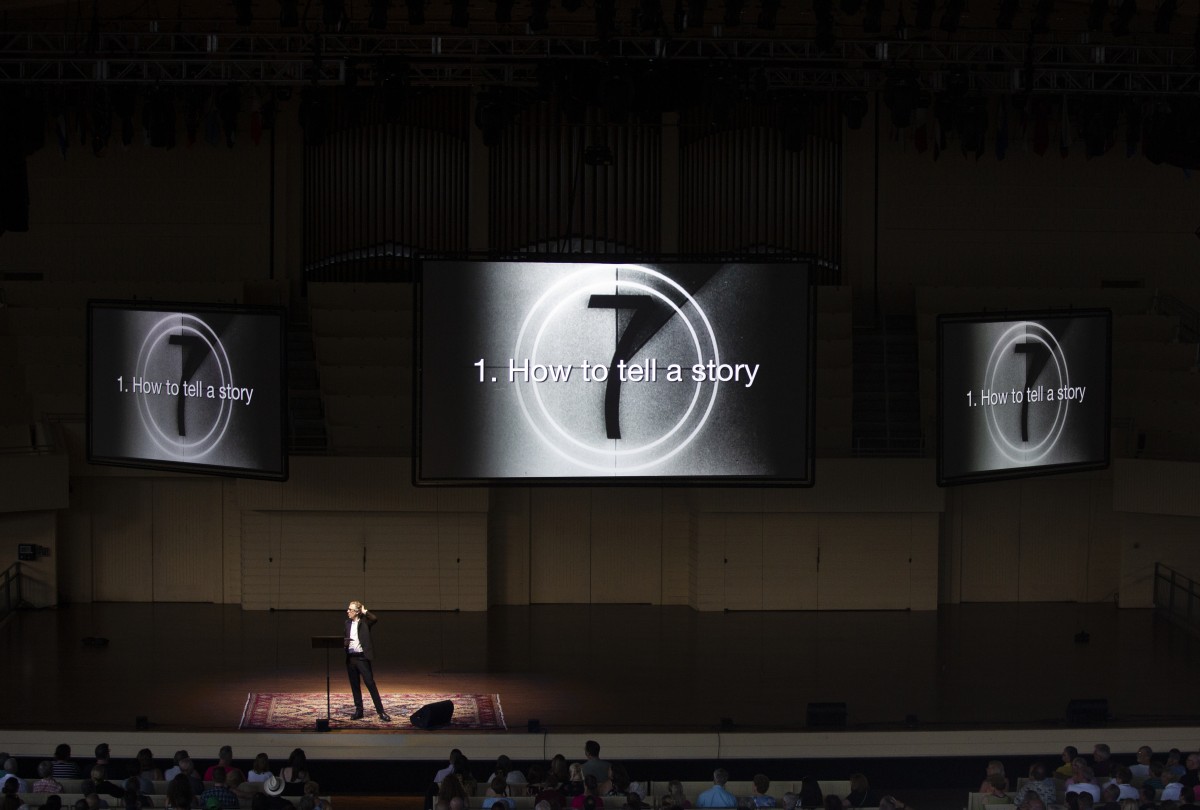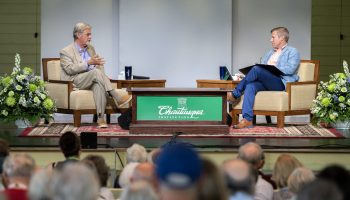Great stories happen to those who can tell them. With a sense of humility and some self-deprecating humor, Ira Glass does not consider himself one of those people.
Glass, creator and host of NPR’s “This American Life,” spoke to his storytelling process with a mix of audio and visuals at 8:15 p.m. Saturday, July 20 in the Amphitheater. Under Glass’ editorial direction, “This American Life” has won the highest honors for broadcasting and journalistic excellence, including six Peabody awards.
“We all know people who anything happens to them and they tell you a great story,” Glass said. “I am not one of those people at all.”
Glass started at NPR as a 19-year-old intern and never looked back — except on Saturday to reflect on seven lessons he’s learned over the years. They’re not the only seven, nor are they the most important. Some were “hard fought knowledge,” others, just for fun. All were worthy of sharing.
His first lesson was “how to tell a story,” where Glass argued it’s not always the content of a story that matters — with a strong narrative and forward motion, banal events can become compelling tales.
“At the heart of what we’re doing is narratives; we’re telling stories,” he said. “In fact, the things that made us different from other public radio shows is that we were doing journalism, but the journalism was all narrative; we were telling stories about people where things unfold.”
Glass played the first example from “This American Life,” a story told by the mom of a 13-year-old girl who loved watching “Saturday Night Live,” which inspired her to want to dress up like Hillary Clinton for Halloween — the red blazer, make-up and all.
After seeing her daughter in make-up, the mom said, “Wow, you look so much better.”
Immediately understanding her words’ repercussions, the mom feared for the worst — everything from an initial meltdown to long-term therapy. Luckily, the outcome was none of the above. Her daughter simply replied, “I don’t think you’re supposed to say something like that to me.”
The story was complete at that point, but complete isn’t enough for radio.
“That’s really not enough if you want the story to be satisfying,” Glass said. “Somebody has to have a thought about what the thought means, some idea about what the story is. The thought doesn’t have to be the most profound idea in the world, it just has to be kind of interesting.”
Glass followed up with the teenage daughter in a phone interview to see if her mom’s comment left any permanent damage. She said although she doesn’t consider it a big deal, she would definitely use it against her mom as leverage, if needed.
Glass is not claiming this method is his own invention. When it comes to telling good stories, Glass is comforted to know that he and Jesus had the same set-up.
To journalists who feel like they get nothing out of interviewing kids, Glass said they are just asking the wrong questions. For his second lesson, Glass described the experience of interviewing Joseph “Joe No Love” Kendrick, a 14-year-old who refused to believe in love because he witnessed the downfall of one too many middle school relationships.
“I really don’t think it would be worth all of the pain,” Joe said in a recording of “This American Life.” “Some people commit suicide over it, and I just don’t think that’s a good thing to get caught up in.”
Glass then shared a video of interviews with some of Kendrick’s classmates. Just asking the students about their thoughts on love resulted in hours of unedited content.
“They just poured out their hearts; which I have to say points to why it is so much easier to interview kids than adults, why it’s actually better if you interview kids than adults,” Glass said. “With adults, it takes much longer to get to that point. Adults, we are guarded, we learn to be guarded, where as kids, they’ll say what they think.”
Children have a sense of urgency that can create a story out of nothing, Glass said.
“Kids are constantly getting into situations where they have this feeling of ‘OK, I’m doing this for the very first time and what happens now is going to affect who I am for the rest of my life,’ ” he said. “The stakes in their lives are just very, very high.”
Glass caught up with Joe 10 years later. With a girlfriend and a new outlook on life and love, the only thing Joe agrees with his younger self on is that “suicide is not a good thing to get caught up in.”
His next lesson, “How do you know if your kid will grow up to be a mascot?” was self-explanatory. If a child pretends to be a dog to the extreme that Navey Baker did growing up, there’s a good chance they will grow up to be a professional sports mascot. A really good one.
For his fourth lesson, Glass said “it’s normal to be bad before you’re good.”
When Glass started as an NPR intern in 1978, he was intimidated by his superiors’ skills.
“I remember thinking these people had some magic power that I didn’t have,” he said. “It was like they were on the other side of some wall that I was never going to get across. I just had no idea how you could get from where I was — incompetent — to where they were, which was grossly competent.”
Glass played a kitschy clip from his early years at NPR. He visited an Oreo production factory, and for the first time, he thought he nailed a story. Audio of his timid, 20-something self came over the Amp speakers, which ran through his visit in a condensed, lackluster fashion — something he now seamlessly describes in vivid detail.
“I bring this up to say it’s normal to be bad before you’re good,” he said. “I wish somebody had told me that. I felt terrible for years. All you can do is just make a lot of work. You have to be disciplined, you have to put yourself on a schedule, you have to make work regularly, you have to show it to people, get their reactions and think about their reactions.”
To improve, Glass paid NPR reporters $50 to read his work and tell him what he was doing wrong.
“There are things I learned, through that, that I continue to do to this day,” he said. “It was so much cheaper than grad school.”
For the record, he is still appalled some of the reporters actually took his money.
For the fifth lesson, Glass said his motto is “failure is success.”
According to him, the process of choosing stories and creating content for “This American Life” is utter “chaos.”
“We consider tons of stuff, it’s a mix of pitches from journalists and random people write us,” he said. “I would say most of the best things we do come when someone on staff gets obsessed with something and wants to know everything about it.”
Glass is often asked how he gets people to say such personal things on-air, and the truth is, most of the time, he doesn’t.
“Most stories we try die in the process; it’s inefficient by design,” he said. “We run thing after thing after thing waiting for lightning to strike and because we come out every week, we need lightning to strike every week. The fact is, lightning is not going to hit you unless you spend a lot of time in the rain.”
But because quotes are the most important element of any radio story, Glass keeps looking.
“In a radio piece, you are peculiarly dependent on the quotes,” he said. “In a print piece, you don’t need that, but in a radio piece, you really need the person to be able to talk about what happened to them and ideally, with feeling, because a story is an engine for feeling.”
In his next lesson, “amuse yourself,” Glass said the lack of humor in news stories is a “failure of craft.”
Sometimes a story delivers a laugh on a silver platter, like when a hotel clerk’s response to Beto O’Rourke running for president was none other than “Yas queen.” Other times it’s folded in the narrative, such as when one of Glass’ reporters, Chana Joffe-Walt, claimed a lawyer spoke in such a way one could “hear his bow tie through his voicemail.”
“Funny moments make a story more interesting, they keep you tuned in and also, if you travel the world, you’ll notice even in very sad and dark situations, weird, funny and inspiring things happen,” he said. “What it is doing is reaffirming that the world is a place where surprise and pleasure are possible — it makes things hopeful.”
In his final lesson, Glass candidly discussed the state of news media and the threat of the misleading, non-factual information plaguing the internet.
The radio example he played started with a political fight about immigration in Homer, Alaska, right after the 2016 presidential election. Liberals on the city council proposed a resolution that would welcome immigrants to Homer, including undocumented immigrants and Muslims, but Trump supporters on the city council took it as a direct threat.
“It became the most bitter political fight anyone in the town could remember,” Glass said. “It turned people against each other in a very ugly way. It led to a recall election. They had their own email scandal.”
Everyone in Homer took sides, except for 27-year-old Ben Tyrer. Before the disagreement, Tyrer had no interest in the news, so when he tried to educate himself on the immigration issues taking over his town, he found himself overwhelmed.
“His understanding was that publications like The New York Times and The Washington Post had a bad rap, so he didn’t really spend too much time there,” Glass said. “He would go to a site like the BBC, but worried maybe they were giving him a liberal bend. So then he’d go to a site like this conservative Canadian one he found, ‘The Rebel,’ but he knew he couldn’t fully trust that either.”
Tyrer read about “no-go” zones in France — neighborhoods where Muslims don’t allow non-Muslims — and about crime waves sweeping Germany and France due to Muslim refugees.
And after a week of this, Tyrer came to his conclusion: Allowing immigrants into Homer was too dangerous. However, thanks to Glass’ reporter, Brian Reed, Tyrer found out a majority of the stories he read were either exaggerated or completely false.
The no-go zones in France? They didn’t exist. Other than the crime of crossing the border or overstaying a visa, there was also no evidence of an increase in crime by immigrants in Germany in 2015.
“It had never hit me so starkly,” Glass said. “We all know that there is a massive machine out there that is churning out non-factual stories, but at the fact-based media where I work, we don’t even bother to check those out because there are so many of them and so they just stand there, uncorrected.”
Glass said “alarmed” doesn’t begin to capture how much the fake-news epidemic worries him, but feels people need to stop attributing the problem to the current administration.
“This is a seismic moment in our country that we are living through,” he said. “President Trump, like President Obama, is going to be out of the White House someday. As a non-partisan journalist, I have no position on that at all, but this information ecosystem I’m talking about, this will be around for the rest of our lives.”
The culprits of the misinformation see fake news as an information war. And the lesson, according to Glass, is that it’s time journalists did, too.
“We need to treat this as a war,” he said. “We need to flood the zone with money and new ideas about how to reach people and what to reach them with, and with new, original content that is targeting an audience that is not buying fact-based information right now. I believe this is a moment that requires a strategy that is yet to be inflicted by a team that has not yet picked up arms.”
But there’s good news. Television has “never been better.”
“You can’t even watch all the stuff your friends tell you to watch,” Glass said. “Television is so good. If the people who ran television ran our climate policy, it would be fixed. If the people who ran ‘Fleabag’ were running our Iran policy, they would have denuclearized eight years ago. I’m sure of it.”






